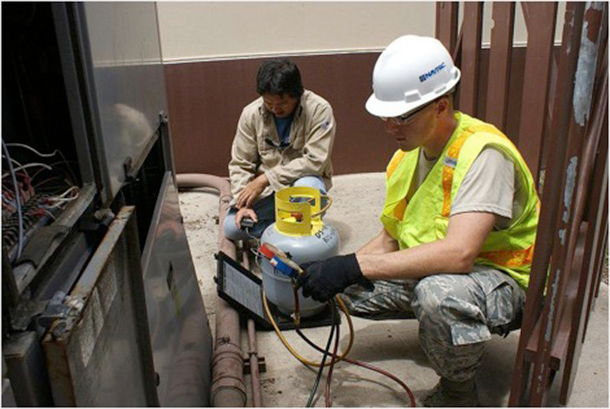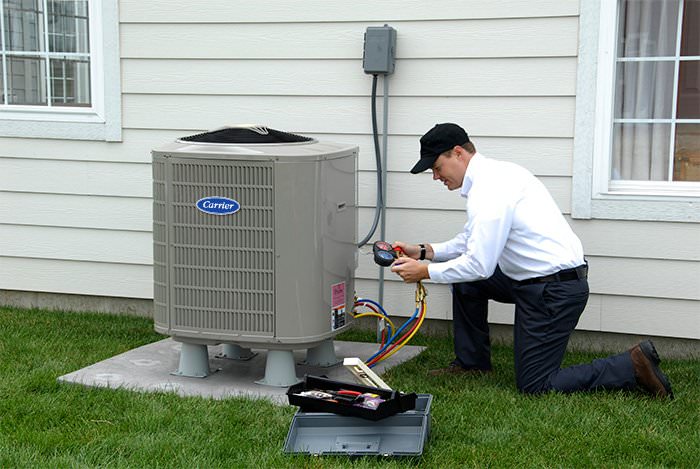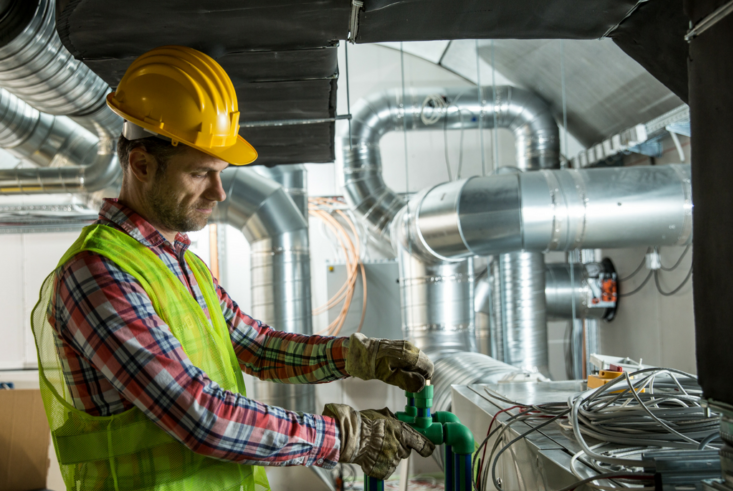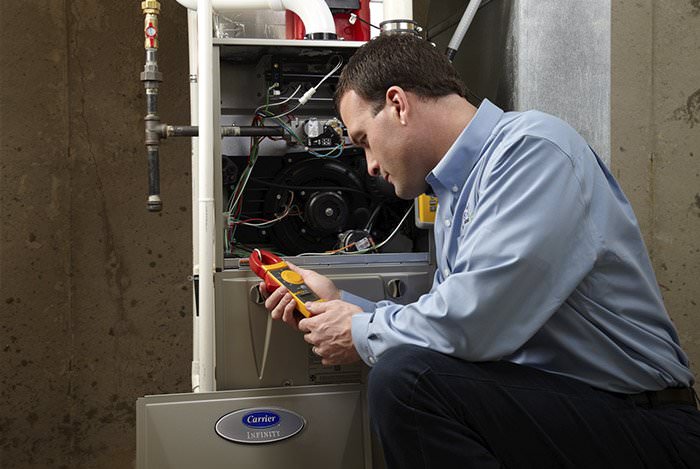Heating and air conditioning units have become a vital part of our daily lives. Although these units bring comfort and convenience for users, no one thinks about their mechanism until one of them breaks down. In such a case, the first person that you need to call is an HVAC technician.
The advancements in HVAC technology have caused an increase in the demand for technicians who can efficiently install, repair, or replace HVAC units. This is also evident from the annual wages that skilled technicians in this field are earning. Working with HVAC systems can be quite dangerous, which is why it is essential to hire a licensed Virginia HVAC technician.
If you want to work in Virginia in the HVAC field, you will need a contractor's license. Here we have provided detailed information on how you can obtain your Virginia HVAC license.
How to Become an HVAC Technician in Virginia
If you want to become an HVAC technician in Virginia, there are three levels of licensing that you can achieve - journeyman, master, and contractor. Before you can go through the licensing examination process, you will also need approval from the state.
If you are moving from another state to Virginia and have a certification or a currently valid master or journeyman license, you will need to submit a copy of the license or certification card before you can sit for the same examination level. For each type of license, you will be required to fulfill certain requirements listed below:
Journeyman License Requirements
The candidate must meet one of the following prerequisites:
- A practical experience of two years and certification of a two-year program
- Trade experience of six years and 80 hours of formal vocational training
- Five years of trade experience and 160 hours of vocational training
- Four hours of trade experience and 240 hours of formal training
- Ten years of practical experience authenticated with the help of affidavits provided by employers or people who have observed the candidate at work
- A bachelor’s degree in engineering and one year of practical experience
Master License
In order to attain your master's license, you will require either one year’s experience as a licensed journeyman in Virginia or ten years of experience with affidavits from employers confirming your work experience.
Requirements for Contractor Licensing
HVAC contractors can be classified into three classes - A, B, and C.
Class A contractors can work on all projects irrespective of their complexity and size. Moreover, they do not have to face any fiscal restrictions.
Class B contractors can work on projects, not more than $120,000. They are restricted to work on total projects worth $750,000 annually.
Class C contractors cannot work on projects worth more than $10,000. Annually, they can accumulate projects worth $150,000.
For an HVAC contractor license, you will need to do the following:
- Apply to the DPOR
- Complete the eight-hour course
- Take the Law, General, and Advanced examination
- Pass the exams needed for the particular trade
- Carry insurance
- Ensure that you have the required experience and proof for the class you are applying for.
What Makes Virginia a Great Place to Start an HVAC Career?
The HVAC industry has become one of the leading industries because of ground-breaking research and inventions. Now it needs skilled and knowledgeable professionals who can work with modern technology. With the increased demand for HVAC professionals, Virginia presents tremendous opportunities for HVAC technicians.
The following are some major aspects that make Virginia a great place to start an HVAC career:
Employment Opportunities
It is a known fact that Virginia gets very hot in the summers, which creates lucrative employment prospects for HVAC technicians. The hot and humid weather of Virginia creates a strong demand for technicians who can install, plan, diagnose, and repair HVAC systems.
Hourly Salary Rates
Virginia is a state that pays quite handsomely for HVAC services. The hourly salary rates offered in Virginia are quite high as compared to other states.
Quality Training Programs
Virginia is home to numerous well-reputed and accredited educational institutions that provide quality HVAC training programs. If you are in Virginia, you can benefit from practical experience as well as quality classroom education, thus providing you with a bright future.
Job Outlook and Salary For HVAC in Virginia
The job outlook for HVAC technicians in Virginia is quite favorable. There is high anticipation of growth mainly because of three factors - environmental concerns, increased construction, and the life expectancy of HVAC units. Many residential and business consumers have become environmentally conscious and are looking to upgrade, replace, or retrofit older and less energy-efficient systems with newer and greener models.
Secondly, as more commercial structures and homes are built, there is more demand for qualified HVAC technicians who can install modern climate-control systems.
Moreover, HVAC units have a life expectancy of ten to fifteen years, which further ensures sustained opportunities for trained technicians.
According to the Bureau of Labor Statistics, the demand for highly trained, well-educated HVAC technicians is estimated to grow about 15% from 2016 to 2026.
The average annual salary for an HVAC technician in Virginia comes to almost $56,416, which means approximately $27.12 per hour and $4,701 per month. While the data shows salaries as low as $23,000 and as high as $92,980, the majority of HVAC salaries in Virginia range between $38,170 and $60,192 annually, with top-level contractors earning $77,809 annually.
The average pay range for HVAC technicians in Virginia varies greatly, which suggests there is a great scope for advancement and increased pay opportunities based on location, skill level, and years of experience.
- Entry Level: $13.78 per hour; $28,660 per annum
- Mid-Level: $24.02 per hour; $49,970 per annum
- Master-Level: $35.41; $73,650 per annum
Insurance and Tax Information for HVAC Techs in Virginia
As an HVAC contractor, you must have insurance to protect you against any unforeseen problems. You or one of your workers may damage a client’s property incidentally; a vendor could become hurt on your property, or your commercial property could become damaged in a storm.
You could be held liable and may have to pay medical bills or costly legal fees in such cases. However, with the right insurance, you can protect yourself from financial ruin. The following are some types of insurance policies that an HVAC contractor must have:
- Commercial General Liability - This insurance safeguards against third-party property damage, moisture damage, repair problems, and other similar problems so that you do not have to pay the damages from your own pocket.
- Errors and Omissions - This insurance protects you and your employers against any negligent claims made by your clients.
- Commercial Property - This type of insurance covers your physical property as well as the contents inside.
- Workers Compensation - You must have this type of insurance if you employ staff. It covers liabilities related to illnesses and injuries sustained by your employees while they are on the job.
Virginia Cities with Highest Average HVAC Salaries
Although Virginia offers pretty attractive salary rates to HVAC technicians, some cities have higher salaries than others. These include:
Richmond
The best city for residential HVAC technicians with regards to salary is Richmond, where the average hourly salary is as high as $27.28. Thus, the average annual salary is $56,749.
Alexandria
The second city in the list of highest average HVAC salaries is Alexandria, where the average hourly salary is $26.92. This means that you can earn up to $55,986 annually.
Arlington
Alexandria is closely followed by Arlington, where the average salary rate is $25.38 per hour. In addition to overtime compensation, you can earn $52,795 per year.
Charlottesville
If you want to pursue a career in HVAC, then Charlottesville is also a great place. Here you will earn $24.88 hourly, which means an average salary of $51,759 annually.
Portsmouth
Although Portsmouth is the last city on our list, its average hourly salary of $24.25 is still pretty impressive. Thus, here you can easily earn an average annual salary of $50,445.
Conclusion
Formal training and proper education, together with the proper license, will increase your chances of attaining bigger and more demanding HVAC projects. Once you get your journeyman or master’s license, you will be able to move up in your current company or look for better job prospects.
However, if you want to start your business, then a contractor's license is well worth studying for.
People Also Ask
If you want to pursue a career in HVAC in Virginia, then you should have complete knowledge about the working conditions there. The following are some of the questions that people usually ask about the rules and regulations regarding the HVAC field:
How Much Does It Cost For HVAC School in Virginia?
Virginia is home to some of the best HVAC institutions, which can greatly help you in pursuing a career in this field. These institutes are dedicated to ensuring a bright HVAC career for students by providing them with excellent staff, equipment, and environment. Typically, an HVAC training program from a well-reputed school will cost you around $5000 to $10,000.
What is the Demand For HVAC Technicians in Virginia?
According to the data provided by the Bureau of Labor Statistics, the demand for highly trained and well-educated HVAC technicians is expected to grow up to 15% through 2026.
How Long Does It Take to Get an HVAC License In Virginia?
To get a journeyman license in Virginia, you must have ten years of experience in the field or 80 hours of vocational training and six years of trade experience. For a master's license, you will require ten years of field experience or one year of experience as a licensed journeyman. However, if you want a contractor license, you will need to apply to the DPOR, take an eight-hour course, carry insurance, and pass the exam.
Nearby HVAC Schools
Here are some HVAC schools in nearby states:






